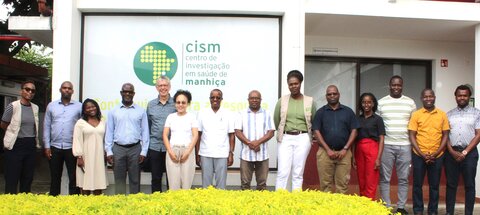MMV’s Timothy Wells visits CISM researchers in Mozambique to discuss lessons and advances in malaria

During a recent visit to the Manhiça Health Research Centre (CISM), Dr Timothy Wells, Scientific Advisor to the Chief Executive Malaria Medicines Venture (MMV), reflected on the importance of the PAMAfrica consortium, as the grant comes to an end. He believes this transitional moment offers an excellent opportunity to share learnings and pave the way for the future, especially as discussions on the new European and Developing Countries Clinical Trials Partnership (EDCTP3) programme progresses.
“We have gained significant experience from PAMAfrica, including valuable lessons that we can apply in our future research partnerships,” said Dr Wells, who was recently awarded an Honorary Doctor of Laws by the University of Dundee in Scotland for his outstanding contributions to the fight against malaria.
PAMAfrica is an international research consortium taking a portfolio approach to the development of new antimalarials by conducting three clinical trials – a next-generation drug combination to treat uncomplicated malaria; the first-ever malaria treatment for babies; and a new medicines for severe malaria. Funded through an EDCTP2 grant, the consortium consists of researchers from Mozambique, Burkina Faso, Gabon, Germany, Spain, Uganda, anas wel as pharmaceutical partners Novartis and Merck. Beyond conductin innovative clinical trials, the consortium aims to strengthen institutional and human capacities to combat malaria, especially in the African regions at highest risk of infection
Discussing new strategies to defeat malaria

In March, Dr. Wells visited the Manhiça District Hospital, including the Clinical Trials Unit and the center’s facilities. During the visit, the teams held strategic meetings within the scope of the project and engaged in a scientific seminar to discuss advances in the efficacy of antimalarials and mechanisms to combat resistance to these drugs.
The growing resistance to artemisinin-based combination therapies (ACTs) for treating malaria highlights the urgent need for new strategies to combat the disease, whether through pharmacological approaches, vaccines or preventive measures. During the scientific seminar, the impact of combination therapies, including the use of monoclonal antibodies and new drug combinations in the fight against resistance to antimalarials, was widely discussed. The effectiveness of mosquito nets using pyrethroid insecticides as a strategy to strengthen transmission control was also discussed. In addition, researchers highlighted the challenges related to the production, cost and supply of new treatments, emphasizing the need for further advances in research to eliminate the disease.
Strengthening research capacity through partnerships

The PAMAfrica consortium also stands out for its commitment to academic training and capacity building, with a notable focus on five Master’s scholarships in Biostatistics. These scholarships have been essential for the training of new African researchers, under the supervision of experts such as Dr Quique Bassat from the Barcelona Institute for Global Health (ISGlobal) and the University of Barcelona, and Dr Arsénio Nhacolo, from CISM. In 2023 and 2024, three Master’s students in Biostatistics from Burkina Faso, Gabon and Mozambique received their diplomas. The consortium is also supporting five doctoral students, reinforcing its role in developing a new generation of scientists dedicated to fighting malaria.
CISM is also contributiong to capacity strengthening initiatives be providing short- and long-term trainings, including target trainings on Good Clinical Practices and Good Clinical Laboratory Practices (GCP/GCLP) in 20 African countries. During the COVID-19 pandemic, these trainings were mostly held virtually, benefiting around 115 participants between 2020 and 2021. In 2023, CISM resumed face-to-face trainings, training 83 professionals in Burkina Faso, an important milestone for the project.
MMV, which is a memebr of numerous global partnerships like PAMAfrica, has a distinguished track record of developing innovative treatments for malaria. Since 1999, it has worked with public and private partners to help save lives and reduce the burden of the disease. However, progress towards eliminating malaria has stalled, with over 250 million cases and 597,000 deaths recorded in 2023. In 2024, MMV-supported products are estimated to have benefited an estimated 711 million people and saved approximately 17.4 million lives. As MMV’s Chief Scientific Officer for over 20 years, and since 2024 as Scientific Advisor to the Chief Executive, Dr Wells has helped MMV continue to drive significant innovation in antimalarial medicines, with a promising pipeline of new treatments in development.
The fight against malaria remains a global priority, and collaborative initiatives like PAMAfrica play a crucial role in the quest to eradicate the disease. These efforts not only drive the development of new solutions, but also strengthen public health, especially in the African regions most affected by malaria.